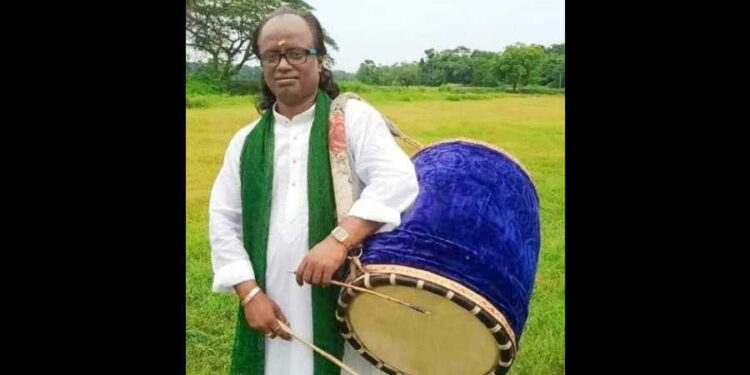Eminent dhaaki Gokul Chandra Das is one of the winners of this year’s Padma Shri awards, saw the honour as a recognition of the traditional Indian percussion instrument — the dhaak.
The dhaak is an integral part of Bengal’s culture and festivities.
He is the first “dhaaki” to receive the Padma award and break barriers by encouraging women to play the dhaak, dedicated the award to his guru, tabla maestro Tanmay Bose, who was the first to recognise his exceptional talent.
At Bidhanpally in North 24 Parganas’ Maslandapur, the beats of the dhaak echoed with a new purpose—one that celebrates not just tradition, but transformation. The rhythmic drumming, usually heard during Durga Puja, took on a different meaning as dozens of women dhaakis played in unison to honor their guru, Padma Shri Gokul Chandra Das, a pioneer who has not only preserved this age-old art form but also redefined its legacy by empowering women to claim their space in a male-dominated tradition.
For decades, the dhaak, a large traditional drum, was an instrument of men, deeply embedded in Bengal’s cultural and festive landscape. But Das, who is nearing sixty is an old master drummer, who saw the winds of change long before others did. While his career boasts collaborations with music legends like Pandit Ravi Shankar and Ustad Zakir Hussain, it is his commitment to gender inclusion that sets him apart.
His journey toward training women began unexpectedly while traveling abroad with Ustad Zakir Hussain. During a visit to a musical instrument shop in the USA, Das was surprised to see a female shopkeeper skillfully playing various instruments, including the saxophone, flute, and clarinet. That moment sparked a vision.
“If women can master such complex instruments, why not the dhaak?” he thought. Determined, he returned home and set out to train the women of his village, challenging deep-rooted societal norms.
Das’s vision, however, faced resistance. His younger son, Nepal, recalls how skepticism and ridicule surrounded his father’s efforts. Even the women themselves were hesitant. But one person changed that—Uma, Nepal’s sister-in-law and Das’s first female disciple.
“The beginning was not easy,” Uma recalls. “People laughed at us, especially women. But once we started performing at public events and even earning from it, perceptions changed. Today, many from neighboring villages have joined our troupe.”
What began as a small, defiant group of female drummers has now grown into a powerful movement. Maslandapur Motilal Dhaki.com, Das’s training institute, now boasts over 150 women dhaakis who perform across the country and abroad, proving that passion and perseverance can dismantle even the strongest stereotypes.
For Rumpa Sarkar, who has been training under Das for seven years, the dhaak was more than just an instrument. It became her path to financial independence.
“I travel from Barasat to Maslandapur for training, and it has changed my life. I’ve performed across India, worked in movies in Kolkata and Mumbai, and most importantly, I can now afford my child’s education,” she says proudly.
He has also trained around 400 women to play the dhaak. At least 90 women are in his team with 200 male players. Gokul’s guru Bose said Gokul “single-handedly brought the dhaak from Puja pavilions to the world of classical concerts”
Despite his many accomplishments, Das’s mission is far from over. His dream is to establish a dedicated dhaak academy where drummers from different regions can share their unique gharanas and preserve the diverse rhythms of Bengal.

“Only an academy can ensure that the dhaak and its cultural significance do not fade into history,” Das says. He is also working on a book documenting the techniques, variations, and aesthetics of playing the dhaak the first of its kind. He believes that by integrating dhaak into modern musical compositions alongside Western percussions, the instrument can continue to evolve and remain relevant for future generations.
As Das returns to his village, his students have planned a grand rally of dhaaks to welcome their mentor, a symbolic tribute to a man who dared to challenge tradition and orchestrate change.
With each powerful drumbeat, Gokul Chandra Das has not just kept a dying art alive he has given it new life, a new rhythm, and most importantly, a new voice.


















Discussion about this post